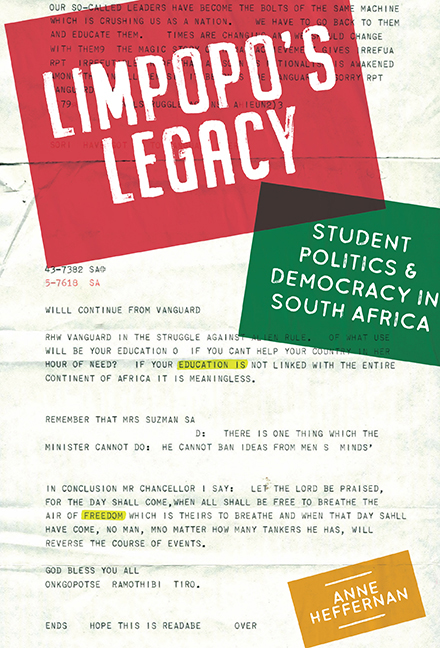Book contents
- Frontmatter
- Dedication
- Contents
- Acknowledgements
- Abbreviations and Acronyms
- Map of the north-eastern Bantustans showing the location of Limpopo
- Introduction
- 1 Turfloop, Crucible of Change
- 2 Centre of the Storm
- 3 Africanization: The New Face of Turfloop
- 4 Black Consciousness in Decline
- 5 Congresses and Comrades
- 6 Populism and the New Youth League
- 7 Julius Malema and Youth Politics in the New Limpopo
- Epilogue: Legacies of Limpopo
- Bibliography
- Index
5 - Congresses and Comrades
Published online by Cambridge University Press: 23 July 2019
- Frontmatter
- Dedication
- Contents
- Acknowledgements
- Abbreviations and Acronyms
- Map of the north-eastern Bantustans showing the location of Limpopo
- Introduction
- 1 Turfloop, Crucible of Change
- 2 Centre of the Storm
- 3 Africanization: The New Face of Turfloop
- 4 Black Consciousness in Decline
- 5 Congresses and Comrades
- 6 Populism and the New Youth League
- 7 Julius Malema and Youth Politics in the New Limpopo
- Epilogue: Legacies of Limpopo
- Bibliography
- Index
Summary
The 1983 launch of the United Democratic Front (UDF) in a community hall in Mitchell's Plain on the Cape Flats has come to symbolize the rise of deeply local politics in the anti-apartheid struggle. The UDF was dominated by civics, trade unions, student groups, and women's organizations. Eventually it came to envelop hundreds of these types of local and regional organizations across the country, all under the banner of nonracialism. In a shift from the dominant political ideology among students of the previous decade, when Black Consciousness had advocated racial separation as a necessary precondition for psychological and political freedom, the UDF reclaimed the earlier tradition of the ANC and other Charterist organizations that based their nonracialism on the ethos of the Freedom Charter.
But the birth of the UDF in 1983 was only the latest and most public move to locally root anti-apartheid politics. In this chapter I argue that increasing regionalization in the realm of student politics predates the UDF by several years, and that those early political entities had a profound effect on, and in many cases became, later UDF affiliates. To do so, I will focus particularly on the Congress of South African Students and student and youth congresses of the Northern Transvaal, and the tensions that existed between these local organizations and the national structures to which they affiliated.
The 1979 founding of the Congress of South African Students (COSAS) predated the UDF by four years and marked the first reemergence of Charterism in national politics. It also effectively expanded the student struggle well beyond the crucible of universities, a major centre of 1970s activism, and beyond the schools of Soweto, which had catapulted student protest to international attention in 1976. Tshepo Moloi's study on the Free State town of Kroonstad has suggested that though political activity was slow to start in the area, the activism of school students ‘helped shift Maokeng's politics from quiescence to confrontation’. In the Northern Transvaal, Sekibakiba Lekgoathi has pointed to the expansion of Western-style education in rural areas during the 1970s as a key influence on the growth of student organization in the region.
- Type
- Chapter
- Information
- Limpopo's LegacyStudent Politics & Democracy in South Africa, pp. 149 - 186Publisher: Boydell & BrewerPrint publication year: 2019



